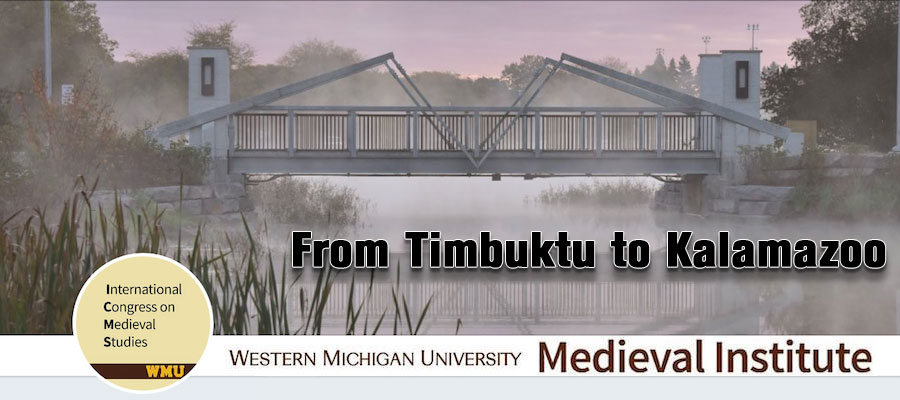From Timbuktu to Kalamazoo, sessions at the 54th International Congress on Medieval Studies, Western Michigan University, May 9–12, 2019
In the wake of recent discussion surrounding the drive to situate medieval studies in a more global framework that attends to the systematic racism and colonialism inherent in our construction of the field, the collaborative group who devised these sessions would like to reissue our CFP in the hopes that its thematization of African-Iberian and African-Mediterranean interconnections is a step towards this goal. We would welcome papers that specifically address historiographical issues that have elided Africa from the purview of medieval studies, as part of or in addition to those topics suggested below, as well as ones that apply various forms of contemporary theory (critical race theory, postcolonial theory, gender/sexuality theory) in their analysis.
The Association of Spanish and Portuguese Historical Studies and the University of Louisville Medieval and Renaissance Faculty Working Group are collaborating to sponsor two sessions of papers to consider the role of Africa in the medieval world. Please see below for information on one session on African and Iberian Intersections and a second session on Africa and the Medieval Mediterranean.
From Timbuktu to Kalamazoo I: African and Iberian Intersections (Association of Spanish and Portuguese Historical Studies)
Given their geographic proximity, it was inevitable that Iberia would look toward Africa and Africa toward Iberia throughout the medieval period. Drawing from history, literature, and cultural studies, this panel examines Iberian-African relations as a crossroads, where contact between the two was defined not by continental boundaries, but rather by the back and forth of nearly a thousand years of empire building that gave rise not only to intercultural conflict, but also to economic, intellectual, and cultural exchange. In conjunction with “From Timbuktu to Kalamazoo II: Africa and the Medieval Mediterranean” (sponsored by the University of Louisville’s Medieval-Renaissance Faculty Workshop), this session seeks to foster a larger discussion about Africa’s place in medieval Iberia, and highlight Africa’s voice and vantage point in the discipline.
From Timbuktu to Kalamazoo II: Africa and the Medieval Mediterranean (University of Louisville Medieval and Renaissance Faculty Working Group)
Studies of the medieval Mediterranean have often focused on its northern and eastern shores, but the trade routes that connected Iberia, France, Italy, and Byzantium were also intertwined with Egypt, the Maghreb, and the Sahara. This panel highlights the ways that peoples, ideas, and objects circulated across different regions of medieval Africa, and between Africa and other areas of the Mediterranean. Rejecting older models of African history as static or passive, it demonstrates the importance of studying medieval Africa both on its own terms and in the larger context of Mediterranean history. In conjunction with “From Timbuktu to Kalamazoo I: African and Iberian Intersections” (sponsored by the Association for Spanish and Portuguese Historical Studies), this session seeks to foster a larger discussion about Africa’s place in the medieval world, and highlight Africa’s voice and vantage point in the discipline.
Session Organizers
Jessica A. Boon, UNC-Chapel Hill
Gregory Hutcheson, University of Louisville
Ross Karlan, Georgetown University
Andrew Rabin, University of Louisville
Noam Sienna, University of Minnesota
Session Sponsors
Association of Spanish and Portuguese Historical Studies
University of Louisville Medieval and Renaissance Faculty Working Group
